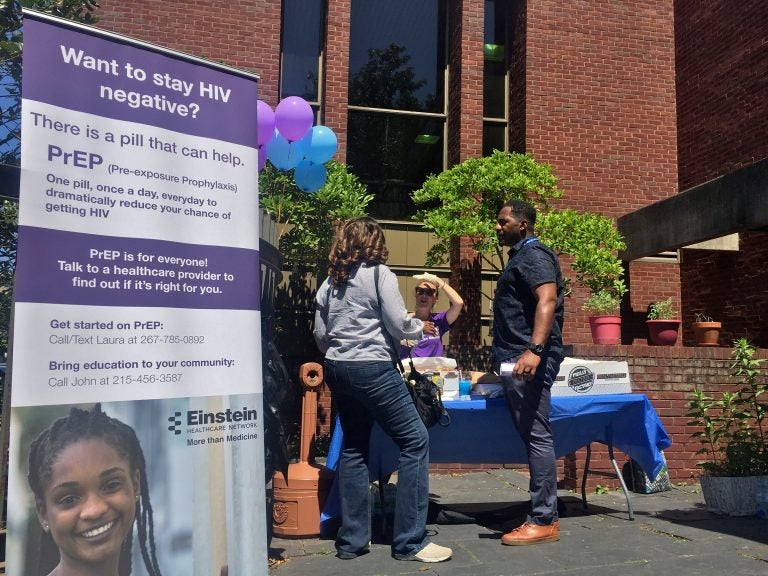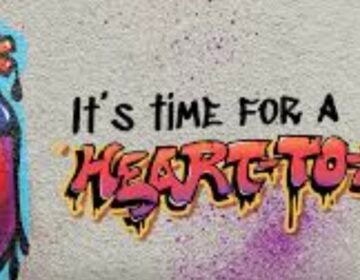PrEP: Spreading the word about stopping HIV
In Philadelphia, non-Hispanic blacks account for nearly two-thirds of new HIV infections. Yet the majority of people on PrEP are white.

John Rose discusses PrEP with members of the community outside the Joseph E. Coleman Library in Germantown. (Dana Bate/WHYY)
With balloons, cold water, and free soft pretzels as incentives, members of Einstein Health’s HIV prevention team hoped to connect with local residents to give them information about PrEP — a once-a-day pill that can prevent HIV infection.
On a warm afternoon in July, John Rose, Laura Martindale, and Aviva Joffe set up their folding table in front of a local library in Philadelphia’s Germantown neighborhood.
PrEP — short for pre-exposure prophylaxis — is a prescription medicine meant for people who are at high risk of getting HIV but who have not yet contracted the disease.
“The people often who need it the most are the people who aren’t engaging with the medical system,” said Joffe, program director of Einstein’s Immunodeficiency Center.
In Philadelphia, non-Hispanic blacks account for nearly two-thirds of new HIV infections. Yet the majority of people on PrEP are white — about 75 percent of patients nationally.
Three years ago, when Einstein ramped up HIV testing, the team realized many patients across its network had never heard of PrEP. Many of those patients are African American.
In January, Einstein — one of 35 places in the city of Philadelphia offering PrEP — started a two-pronged approach to increase awareness. Within the hospital, Martindale started educating primary care doctors about PrEP: when to prescribe it and who might benefit. And outside the hospital, Rose has taken the message into the neighborhoods Einstein serves.
Team members visit local libraries, stake out church parking lots, and educate barbers, who in turn speak with their clients about PrEP.
The outreach workers have even done education inside a North Philadelphia Shoprite.
“We were right behind the cabbages and next to the plants, talking about sex,” said Rose, Einstein’s community prevention and linkage navigator.
The point, he said, is to meet people in the communities where they live, rather than waiting until they are already in the hospital. Rose is African American and says the issue is personal for him.
The community Einstein serves is his community too, and he says it’s important for everyone to have access to information about PrEP.
“Many people that we talk to, they’ve either never heard of it, or they’re suspicious of it,” he said. “Either way, that’s problematic, so we’re trying to bridge that gap.”
Part of the team’s outreach work includes clearing up misconceptions:
PrEP, also know as Truvada, is a medicine that can stop the spread of the AIDS virus, but some people ask if the drug will give them HIV. Others assume you take it after you already have the disease.
In front of the neighborhood library in Germantown, John Rose approached a woman who was so worried about her privacy that she didn’t want to give her full name. Instead she asked to be called “Sally B.” She said it had been a long time since she’d come across any educational information about HIV directed at her and her community. But after only a few minutes of chatting with Rose, she’s engaged.
“I think it’s an excellent thing you’re doing to inform our community about what preventative measures are out there,” she said.
That’s exactly what the team is hoping to do.
“Even two months ago, when we would do this, almost everyone we talked to had never heard of it,” Joffe said. “At Shoprite last week, two or three people said, ‘Oh, I just saw a commercial about that.’ So efforts like that are also helping with the more widespread public awareness.”
Gilead, the pharmaceutical company that makes Truvada, recently began airing TV commercials for its product. Still, many people don’t know where to get the drug or how they’d pay for it.
Truvada carries a list price of about $2,000 for a 30-day supply. Medicaid covers the drug, and Gilead runs an assistance program for the uninsured. The company also provides coupons to defray the cost for those with private insurance.
The cost is a concern for many of Einstein’s patients, so educating them about how to pay for the drug is also part of the outreach effort.
Sometimes Joffe or her colleagues will encounter a patient who was recently infected with HIV.
“When they learn that there’s a pill that could have prevented it, it’s really heartbreaking,” she said. “It’s hard for us as a medical establishment because we’ve failed people in that respect.”
So, John Rose continues to visit libraries, barbershops, and places in between.
“This is the closest thing we can come to stopping the spread of the virus,” he said. “We could basically eliminate it if people who were at risk adhered to a treatment method like this.”
Visit Einstein’s website for more HIV prevention information.
WHYY is your source for fact-based, in-depth journalism and information. As a nonprofit organization, we rely on financial support from readers like you. Please give today.




